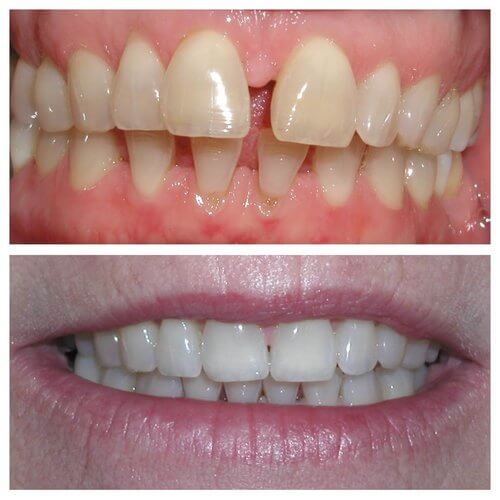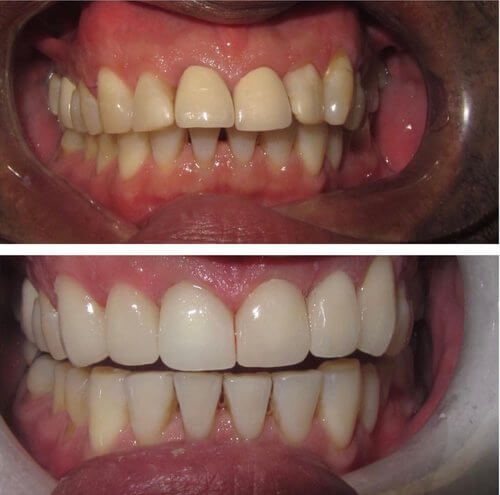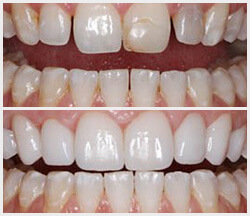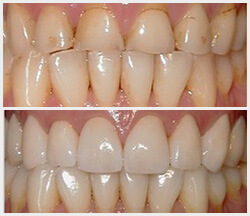The temporomandibular joint (TMJ) connects the jawbone to the skull. Any damage to this joint can cause a range of symptoms, collectively known as TMJ disorders (TMD).
Our Staten Island dentists have created a useful guide discussing the common symptoms of TMJ disorders. That way you know when it’s time to visit your dentist for a TMJ evaluation.
Common Symptoms of TMJ Disorders
Jaw Pain and Tenderness
One of the most common symptoms of TMJ disorder is pain and tenderness in the jaw joint area. This pain can be mild or severe and may worsen when you chew or open your mouth. Some people also experience a dull ache or pressure in the jaw, and the pain may radiate to other parts of the face, neck, or shoulders.
Clicking or Popping Sounds
If you hear clicking or popping sounds when you open or close your mouth, it may be a sign of TMJ disorder. The sound is caused by the disc that cushions the joint from moving out of place. While this symptom isn’t always painful, it can be a cause for concern if it’s accompanied by other TMJ disorder symptoms.
Limited Jaw Movement
If you have difficulty opening or closing your mouth, it could be a sign of TMD. This symptom can make it difficult to eat, speak, or even yawn. In severe cases, you may not be able to open your mouth more than a few millimeters.
Headaches
TMJ disorder can cause headaches, particularly in the temples or behind the eyes. These headaches may be constant or intermittent and may be accompanied by other symptoms such as dizziness or ringing in the ears.
Teeth Grinding (Bruxism)
Bruxism, or teeth grinding, is a common symptom of TMJ disorder. Grinding your teeth can cause further damage to the jaw joint and exacerbate other symptoms, such as jaw pain and headaches. Some people may grind their teeth during sleep and may not be aware of the problem until they experience TMD symptoms.
Where Are TMJ Symptoms Felt?
TMJ symptoms are typically felt in the jaw joint area but can also radiate to other parts of the face, neck, and shoulders. Areas where TMJ symptoms occur include:
- Jaw Joint: Pain, tenderness, clicking or popping sounds, limited jaw movement
- Ears: Often mistaken for an ear infection, accompanied by a popping or clicking sound in the ears
- Head: Headaches, ear pain, tinnitus (ringing in the ears)
- Mouth or Teeth: Difficulty chewing or speaking
- Neck and Shoulders: Tension, pain, stiffness
Do Different TMJ Disorders Cause Different Symptoms?
There are several types of TMJ disorders, and the symptoms may vary depending on the specific condition. The most common types of TMJ disorders include:
- Myofascial Pain Disorder: Pain and discomfort in the muscles that control jaw movement
- Internal Joint Derangement: Damage to the joint’s disc or ligaments, causing clicking or popping sounds and limited jaw movement
- Degenerative Joint Disease: Arthritis or other conditions that cause damage to the joint, resulting in pain and limited movement
- TMJ Ankylosis: Difficulty opening the mouth, pain or discomfort in the jaw joint, headaches, difficulty chewing or speaking, and facial asymmetry
While the symptoms may vary depending on the specific type of TMJ disorder, the most common symptoms tend to be pain, tenderness, clicking or popping sounds, and limited jaw movement.
Frequently Asked Questions
How do I know if my jaw pain is due to TMD?
If you’re experiencing pain or discomfort in your jaw joint or muscles, as well as clicking or popping sounds when you open and close your mouth, you may have TMD. Other symptoms may include difficulty chewing or biting, aching or pain in the face or neck, and swelling on one or both sides of the face. If you’re experiencing these symptoms, seek evaluation and treatment from a doctor.
Can TMD cause ear pain?
Yes, TMD can cause ear pain or a sensation of fullness in the ears, as well as ringing in the ears or dizziness. This is because the jaw joint is located close to the ear, and inflammation or damage to the joint can affect the surrounding structures. Consult with your doctor to learn if your ear pain is caused by TMD.
Can TMD cause headaches?
Yes, TMD can cause headaches, particularly tension headaches caused by muscle tension in the jaw and face. Other types of headaches, such as migraines, may also be associated with TMD. If you’re experiencing frequent headaches along with other TMD symptoms, it’s important to seek evaluation and treatment from your doctor.
Can TMD affect my ability to eat or speak?
Yes, TMD can make it difficult to eat or speak, particularly if you’re experiencing pain, stiffness, or limited range of motion in the jaw. Other symptoms that may affect your ability to eat or speak include clicking or popping sounds when you open and close your mouth. You may also experience the feeling of your jaw getting stuck or locked in place. If you’re experiencing difficulty eating or speaking, seek evaluation and treatment from your dentist.
Don’t Let Jaw Pain Rule Your Life. Know When to Seek Treatment
If you’re experiencing any signs or symptoms of TMD, schedule an appointment with our Staten Island dentists today. Early intervention can help prevent long-term complications and improve your quality of life. With proper diagnosis and treatment, you can find relief from TMD and get back to enjoying your everyday activities.



Insurance
We accept many insurances. Please contact one of our Insurance Coordinators to discuss your dental coverage plan.
(718) 948 5111
appointments@sidental.com
Open 7 days a week
Reviews
The dentists are absolutely excellent…
“I have been going here for years. The dentists are absolutely excellent and they always have an appointment available that fits into a busy schedule. I also completed invisilgn and my teeth are perfectly straight now. They also practice preventive medicine and just went in for my 6 month cleaning. Every time feel like I have a new set of choppers and best yet the check up noted no cavities!.”
— J.R
Pleasant visit
“As usual, it was a pleasant visit thanks to Dr. Nasso and her great staff..”
— C.M.
Always treated with courtesy and respect.
“Always treated with courtesy and respect. All of my questions were answered regarding upcoming treatments..”
— J.C.
Smile Profile




Put your best face forward.
Create a positive change to your teeth and your smile.
